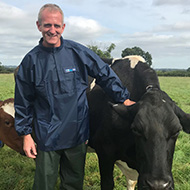
James Russell has been appointed a non-executive director along with Battersea’s Peter Laurie.
Six new members have been appointed to the Animal Health and Welfare Board for England (AHWBE), including Peter Laurie, chief executive officer of Battersea Dogs and Cats Home, and James Russell, former president of the BVA.
Biosecurity Minister Lord Benyon has appointed six non-executive directors to the board, who will take up their seats today (1 November 2021) for three years and will support the new Chair, Jonathan Statham.
All appointments to the AHWBE are made solely based on merit, and political activity plays no role in the selection process. The appointments were made per the Ministerial Governance Code on Public Appointments.
Also joining the board will be Emma Slawinski, director of Advocacy and Policy at the RSPCA, Gwyn Jones, a current non-executive director of the AHWBE, John Reed, a small livestock farmer and a non-executive director of Avara Foods, and Charles Sercomb, a first-generation sheep farmer involved in a wide variety of work in agriculture.
“These appointments will bring a wealth of farming, veterinary and animal welfare experience to the vital work of the Animal Health and Welfare Board for England,” commented biosecurity Minister Lord Benyon.“The UK is a world leader in animal health, welfare and biosecurity and I look forward to working closely with the Board to further build our knowledge, research and resilience in this important area.”
The AHWBE was launched in 2011 to advise Defra ministers on all strategic health and welfare matters relating to kept animals in England. Its responsibilities include animal health and welfare policy, assessing the threat from animal diseases, and reviewing contingency plans for disease outbreaks.



 The Veterinary Medicines Directorate (VMD) is inviting applications from veterinary students to attend a one-week extramural studies (EMS) placement in July 2026.
The Veterinary Medicines Directorate (VMD) is inviting applications from veterinary students to attend a one-week extramural studies (EMS) placement in July 2026.